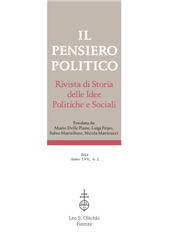«Discussions about liberty are in truth discussions about a negation» : libertà e ordine nel pensiero di James Fitzjames Stephen
P. 153-174
This paper presents the political thought of James Fitzjames Stephen (1829-1894), in particular his vision of liberty. Isaiah Berlin considered him one if not the leading critic of John Stuart Mill. Stephen, who never became an academic, wrote mainly for newspapers. Although his primary occupation was barrister, Stephen dealt with political theory, especially English and French, reflecting on liberty, its moral assumptions and limits. Deeply influenced by Thomas Hobbes, and thus moved by a pessimistic conception of human nature and a realistic vision of politics, Stephen criticized the treatment of political concepts, such as liberty, but also equality and fraternity, in an abstract manner. According to him, such concepts must necessarily be dropped into the reality in which they fit. A proponent of an idea of liberty that is not absolute, but limited by laws, religion, morality, and individual conscience, Stephen represents a liberal with typically Victorian traits. [Publisher's text]
84597 characters
-
Articles from the same issue (available individually)
-
-
Information
DOI: 10.82026/11699
ISSN: 2035-7958


